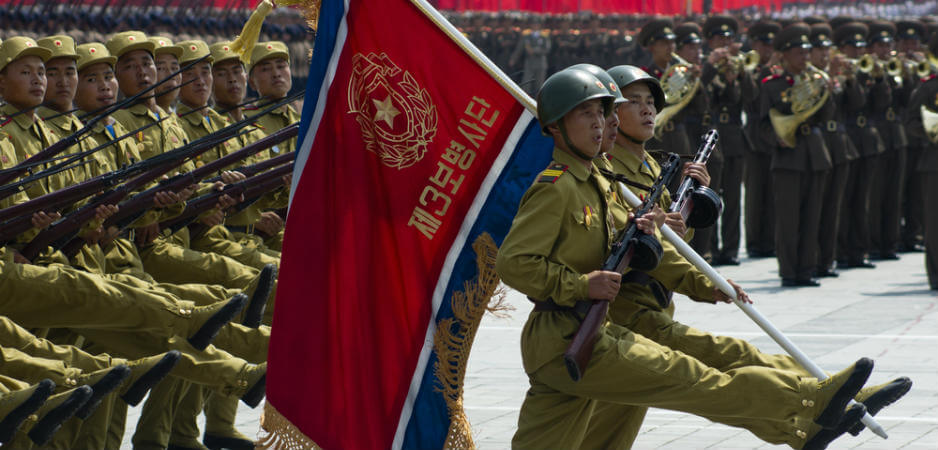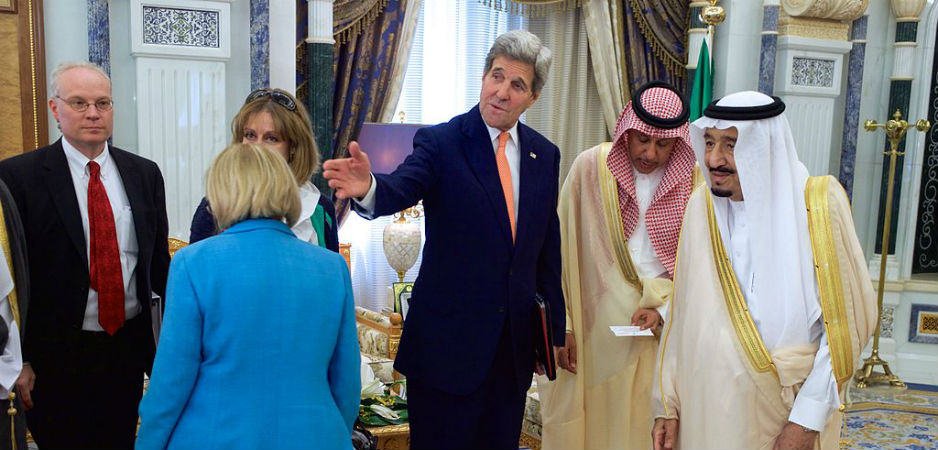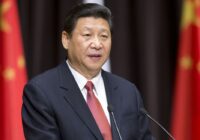North Korea’s nuclear test, China’s stock market crash, and mass attacks on women in Germany pose great dangers to peace and stability.
North Korea, the Hermit Kingdom, is a funny place. A paunchy dictator with a ridiculous hairstyle keeps his people poor and saber rattles like a petulant child throwing a tantrum. Kim Jong-un, the North Korean dictator, is a member of the lucky sperm club. Kim Il-sung and Kim Jong-il, his grandfather and father, ruled North Korea before him and were rather nasty characters. This week, Kim Jong-un decided to emulate family tradition, so his country claimed it had exploded a hydrogen bomb.
The claim is most likely untrue. Hydrogen bombs are sophisticated. Uranium or polonium is split in an atomic bomb. A hydrogen bomb encloses the atomic bomb in a layer of lithium deuteride that causes a larger secondary explosion, producing temperatures of 400 degrees Celsius and sending devastating shockwaves. It is likely that North Korea produced a “boosted” nuclear weapon where a small amount of lithium deuteride made its bomb more powerful but did not quite make it a hydrogen bomb.
An artificial earthquake measuring 5.1 on the Richter scale was recorded near the site of North Korea’s past nuclear tests. The earthquake was not too dissimilar from its past, making the possibility of a hydrogen bomb remote. So, why is Kim making tall claims?
The North Korean leader stakes his claim to the throne on his regime’s putative achievements in science and technology. Missiles and nuclear weapons prove to his people that they are starving to serve their country and help it achieve greatness. The Moranbong, an all-female pop group that performs in short skirts and that is purportedly personally selected by Kim, helps amuse his benighted, indoctrinated and malnourished people. This nuclear test gives them a shot of pride. It also gives Kim another chance to blackmail his neighbors and the United States.
Kim Jong-un lives off China’s support. China props up Kim’s decrepit regime to ensure that American troops are not on its border. The Middle Kingdom also worries about Korean refugees streaming across the border for rice and shelter. So, Kim may be annoying, but North Korea largely serves Chinese purposes—at least for now. Yet all is not well between the two kingdoms. Tellingly, North Korea has not been one of the 37 countries that Chinese President Xi Jinping has visited since taking charge in 2013. Furthermore, Beijing has publicly announced that it “strongly opposed” North Korea’s latest nuclear test.
Kim runs a vassal state but has illusions and delusions of grandeur. No one can say with certitude how far he will go. After executing his uncle, Jang Sung-taek, Kim proceeded to kill all of Jang’s direct family as well other families he was close to. North Korea is a medieval kingdom ruled by a megalomaniac. Kim’s latest nuclear test has added to instability in East Asia. The US has flown a B-52 bomber over South Korea in a show of force even as the United Nations (UN) prepares for a fresh round of sanctions.
The tremors from North Korea’s nuclear test pale in comparison to the tsunami-like effect of the collapse of Chinese stocks. Prices fell by 7% on January 4, the first day of trading in 2016, and trading was suspended. The same phenomenon occurred again. Meanwhile, Chinese manufacturing is declining and the economy is slowing down dramatically.
President Xi has positioned himself as the master of China’s economy. He has fought hard to manage the economy, market and the currency, failing dismally. China has been allowing people to invest abroad for the last two years. What began as a trickle has now turned into a flood. The Chinese fear the fall of the renminbi. Hence, they rush to invest their hard won savings abroad. This capital flight and worsening currency turmoil is causing massive disruption to the Chinese economy.
The old model of spending to stave off slowdown no longer works. The $585 billion stimulus package of 2008 when the Chinese government put money into infrastructure, high-speed railway connections and intercity highways cannot be repeated. China’s efforts to prop up an overinflated market have only cost the taxpayer money.
So far, the Chinese response to crisis has been confused. The Middle Kingdom is making two terrible assumptions. First, that government must intervene in markets when things go wrong. Second, that government knows how to intervene and set things right. As this author commented in 2015, these assumptions only distort incentives, amplify bubbles and transfer risks to the taxpayer.
Very simply, the government is keeping alive many companies that are not viable businesses. This increases bad debts because these companies are not in a position to bounce back. China is throwing good money after bad. The savers who invest their cash in banks and tax payers are suffering most. The poor are subsidizing the rich for no reason whatsoever.
As expected, the Chinese stock market crash prompted a sell-off in markets around the world. Even relatively insulated Indian markets crashed. The global economy is now highly interconnected and China has been a big driver of global growth. For years, China has been buying metals, crops and fuels in its chase for growth. As its economy slumps, rich economies like Australia and Canada as well as emerging ones like Brazil and Venezuela that export commodities suffer slowdown.
Germany is suffering too, though for different reasons. Its stock market tumbled by more than 2%, with its index, the DAX, dropping to below 10,000 because of developments in China. Germany exports machine tools, cars and other high-quality goods to the Middle Kingdom. When the dragon sneezes, Germany catches a cold.
Germany is feeling blue not only because of tumbling markets, but also because of the events on New Year’s Eve. As Germans were ringing in 2016, mass attacks on women took place in Cologne. Hamburg, Dusseldorf, Stuttgart and other towns reported similar attacks. More than 100 women have come forward with reports of violence, sexual assault and robbery. At least two have reported rape. Already, 516 criminal cases have been reported, of which 40% relate to sexual assault. Not since the days that the Red Army wantonly raped German women has the country experienced such trauma.
German police retreated in fear and failed to deal with the mass assaults. The media ignored the issue before it became too explosive to sweep under the carpet. Henriette Reker, the feckless mayor of Cologne, helpfully suggested that young women maintain an arm’s length from strangers. Needless to say, it provoked outrage. Most importantly, the police have been tardy in investigating these mass attacks, arresting those responsible and prosecuting the guilty.
 Germany has lived under the shadow of Adolf Hitler for more than eight decades. During the Nazi era, Germans embraced the pseudo-scientific racism that was prevalent in Europe in the early 20th century. They took this racism to its logical conclusion, killing millions of Jews, Slavs and other untermenschen. Since losing World War II, Germany has wallowed in guilt and been paranoiac about being seen as racist.
Germany has lived under the shadow of Adolf Hitler for more than eight decades. During the Nazi era, Germans embraced the pseudo-scientific racism that was prevalent in Europe in the early 20th century. They took this racism to its logical conclusion, killing millions of Jews, Slavs and other untermenschen. Since losing World War II, Germany has wallowed in guilt and been paranoiac about being seen as racist.
Sadly, it is now clear that the attacks on New Year’s Eve were carried out by men of Arab origin. Yet both the state and the media were terrified of saying so. They feared that doing so would boost the far-right. They continue to dodge the truth. As a result, people are losing faith in both the media and the state. Gradually, Germans might even start to turn against immigrants and refugees if the men who perpetrated these attacks go scot-free. Minorities will only be secure when German authorities convict the bad apples among them.
As per some scholars, the perpetrators of mass attacks are brutalized men with no respect for the law, women’s dignity or even human life. Such men have to be tried, convicted and deported immediately. There is no place for them in any society and Germany is no exception. Yet there is a strange lack of leadership and will in Deutschland. German politicians must remember that people want justice and that mass sexual assaults are explosively emotive, even for postmodern societies. Tragically, the politicians’ pusillanimous pussyfooting is creating a crisis of confidence and paving the path for the rise of the far-right.
*[You can receive “The World This Week” directly in your inbox by subscribing to our mailing list. Simply visit Fair Observer and enter your email address in the space provided. Meanwhile, please find below five of our finest articles for the week.]
Cultural Engagement, Not Military, Will End the Korean War
The Korean War is the root cause of all human suffering on the peninsula. The cycle must be broken, says Michael Bassett.
In 2013, North Korea conducted its third nuclear test, and the world responded by inducing a period of brinksmanship that came dangerously close to spiraling the unending Korean War out of control. US President Barack Obama must have imagined himself as JFK during the Cuban Missile Crisis, expecting to be historically embraced as one of America’s greatest for going nose-to-nose with communism, based on a nuclear gamble that could have led to global destruction.
The problem with Obama’s 2013 gamble was the lack of communication. And North Korea, unlike Cuba in 1962, poses the real concern of becoming a suicidal state. Should we push the country to the brink of suicide, there is a real danger that Pyongyang could start the first nuclear war by launching a nuclear-tipped ballistic missile from a submarine patiently waiting at the bottom of the Yellow Sea or the Atlantic Ocean… Read more
Are Saudi Arabia and Iran on a Collision Course?
With Saudi Arabia and Iran locked in a diplomatic row, concerted international intervention will be critical to avert a regional and global calamity, says former US Ambassador Gary Grappo.
Since the Arab Spring some five years ago, the Middle East has experienced a wave of tragic events. Many of them—Syria’s bloody civil war, Libya’s descent into chaos, the Islamic State’s diabolical barbarism, and Yemen’s senseless proxy war—have led to the loss of thousands of lives and created a massive refugee and displaced persons crisis. Others have sparked great instability and uncertainty, particularly Iraq and Egypt.
The good news in all of this mayhem may have been that at least the region’s governments had managed to avoid open conflict between one another.
That good news may have run its course. Two nations, Iran and Saudi Arabia—among the Middle East’s most powerful and well-armed—have now set themselves firmly on a collision course. The events of the past week—Saudi Arabia’s execution of a well-known and highly… Read more
Living and Escaping a Terrorist Cult
In this edition of The Interview, Fair Observer talks to Masoud Banisadr, a former member of Mujahedeen-e-Khalq.
In 1965, Mujahedeen-e-Khalq (MeK) was established in Iran in opposition to US imperialism. Espousing a blend of Marxism and Islam, the group helped bring about the Iranian Revolution of 1979. However, after breaking with the revolutionary government, MeK embarked on a terrorism campaign and was forced into exile, losing followers in Iran after its support for Saddam Hussein in the Iran-Iraq War.
MeK was designated as a terrorist organization by the US State Department until 2012. The Iranian government estimates that MeK activity has claimed some 12,000 Iranian lives over the last three decades.
Operating from exile, the organization had all the trappings of a cult. Attracting young, idealistic Muslims with slogans of Islamic justice and social freedom, it disrupted familial and social ties, forcing members to divorce their spouses and abandon relatives, making them dependent on the group through isolation, misinformation and manipulation. Masoud Banisadr, a cousin of former Iranian… Read more
Thailand is Playing a Game of Smoke and Mirrors
While British and American officials are coming into conflict with the military, Thailand’s relationship with the EU has been hit.
With Thailand’s slow road back to democracy looking like it has no end in sight, the military junta led by former General Prayuth Chan-ocha is looking for ways to divert international attention from the country’s authoritarian turn.
Already under fire from human rights and civil society groups for detaining anti-corruption activists, torturing civilians in military detention, and driving its own top human trafficking investigator into exile in Australia, the “transitional” government has recently seen a spate of international incidents involving several of its most important partners, including both the United States and the European Union (EU).
Since overthrowing Yingluck Shinawatra’s democratically elected government in May 2014, the Thai junta has seen only mild repercussions from Washington. After the coup, the Obama administration temporarily suspended military aid but ultimately decided to take part in the “Cobra Gold” joint military exercises for fear of driving its longtime ally toward China… Read more
Armed Individuals in Oregon Occupation Are Criminals
The “Citizens for Constitutional Freedom” claim to defend the US Constitution. Ryan Suto explains why they’re wrong.
On January 2, a group of armed individuals took occupation of the United States Fish and Wildlife Service’s Malheur National Wildlife Refuge, a federal building in remote Oregon. They did so on behalf of fellow ranchers who recently turned themselves in for setting fire to federal land.
In both traditional and social media, a national debate has emerged as to how the US government should address this situation, and whether those involved are protesters, occupiers, terrorists, insurgents or a militia. While these are important discussions, at the heart of the matter is an invocation of the US Constitution, which has largely been overlooked.
Cliven Bundy, one of the individuals, has argued: “The United States Justice Department has NO jurisdiction or authority within the State of Oregon, County of Harney over this type of ranch management. These lands are not under U.S. treaties or commerce, they are not article 4 territories, and… Read more
The views expressed in this article are the author’s own and do not necessarily reflect Fair Observer’s editorial policy.
Photo Credit: Astrelok / Shutterstock.com
 We bring you perspectives from around the world. Help us to inform and educate. Your donation is tax-deductible. Join over 400 people to become a donor or you could choose to be a sponsor.
We bring you perspectives from around the world. Help us to inform and educate. Your donation is tax-deductible. Join over 400 people to become a donor or you could choose to be a sponsor.
Support Fair Observer
We rely on your support for our independence, diversity and quality.
For more than 10 years, Fair Observer has been free, fair and independent. No billionaire owns us, no advertisers control us. We are a reader-supported nonprofit. Unlike many other publications, we keep our content free for readers regardless of where they live or whether they can afford to pay. We have no paywalls and no ads.
In the post-truth era of fake news, echo chambers and filter bubbles, we publish a plurality of perspectives from around the world. Anyone can publish with us, but everyone goes through a rigorous editorial process. So, you get fact-checked, well-reasoned content instead of noise.
We publish 2,500+ voices from 90+ countries. We also conduct education and training programs
on subjects ranging from digital media and journalism to writing and critical thinking. This
doesn’t come cheap. Servers, editors, trainers and web developers cost
money.
Please consider supporting us on a regular basis as a recurring donor or a
sustaining member.
Will you support FO’s journalism?
We rely on your support for our independence, diversity and quality.











